- 82% of Arab men and women aged 18 to 24 in 53 cities across 18 Arab states say Turkey is an ally of their nation, followed by China (80%); the US is ranked seventh and Russia ninth
- The US is still seen as a ‘strong ally’ by more than half of Arab youth and two-thirds say it will be a stronger ally of their nation than Russia and China over the next five years
- Russia, named a top-three ally in last year’s study, now ranks in ninth place, rated as an ally by 63% of respondents, below Pakistan (69%)
Dubai, UAE; June 20, 2023: Highlighting shifting geopolitical allegiances in the Arab world, the region’s youth say they view Turkey and China as stronger allies of their country than traditional powers such as the United States and Russia.
This is a top finding of the landmark 15th annual ASDA’A BCW Arab Youth Survey, the Middle East & North Africa’s longest-running attitudinal study of Arab youth and its most frequently cited source of thought leadership, unveiled today by ASDA’A BCW, the region’s leading communications consultancy. The annual survey is the largest study of its kind of the Arab world’s largest demographic – its 200 million plus youth.
ASDA’A BCW commissioned SixthFactor Consulting, a leading research company, to conduct face-to-face interviews with 3,600 Arab citizens aged 18 to 24 in their home nations from March 27 to April 12, 2023, the largest sample in the survey’s history. Interviews took place with an equal number of men and women in 53 cities across 18 Arab states, including for the first time South Sudan. The interviews were deliberately conducted face to face rather than online to maximise the accuracy of the research and to reflect the nuances of Arab youth opinion across the region as much as possible.
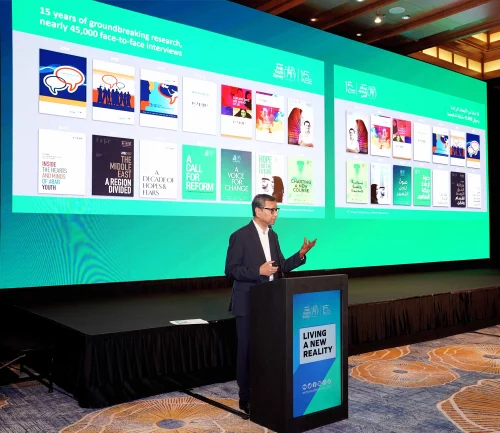
Sunil John, President – MENA, BCW and Founder of ASDA’A BCW, presents the findings of the 15th annual ASDA’A BCW Arab Youth Survey in Dubai.
Today, ASDA’A BCW revealed the main findings under the first of six themes explored in the research, ‘My Global Citizenship’. This tackled a variety of geopolitical issues, including the United States’ intervention in the Arab world and its disengagement policy, ongoing regional conflicts and disputes, and the countries Arab youth say they most want to live in and their own country to be like.
Among non-Arab nations, 82% of Arab youth named Turkey as a ‘strong ally’ or ‘somewhat of an ally of their country’, followed by China (80%), the United Kingdom (79%), Germany (78%) and France (74%).
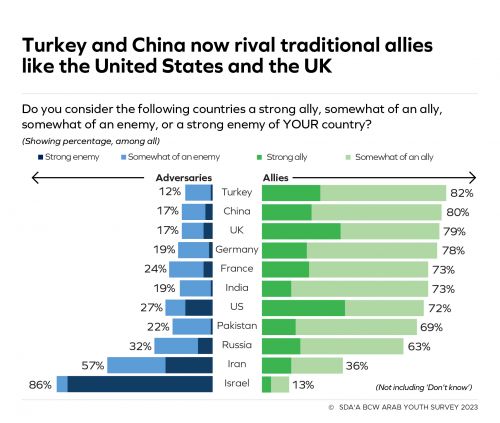
The US ranked seventh, with 72% votes, just below India at 73%. The US and UK, however, continue to be seen as a ‘strong ally’ by more than half of those surveyed, while two-thirds (66%) said America would be a stronger ally of their nation than Russia or China in the next five years.
Russia, a top-three ally in last year’s study, now ranks in ninth place, rated as an ally by 63% of respondents, below Pakistan (69%).
Despite the Abraham Accords signalling a thaw in relations between Israel and several Arab countries, 86% of Arab youth overall say they view Israel as a ‘strong enemy or somewhat of an enemy’, while 57% say the same about Iran.
At the same time, they say the US continues to exert the most influence in the Arab world. Compared to only 3% naming Turkey as having the most influence, and 4% identifying China, a third of young Arabs (33%) say the US is the most influential, followed by the UAE (11%), Saudi Arabia and Israel (both on 10%), and Russia (8%).
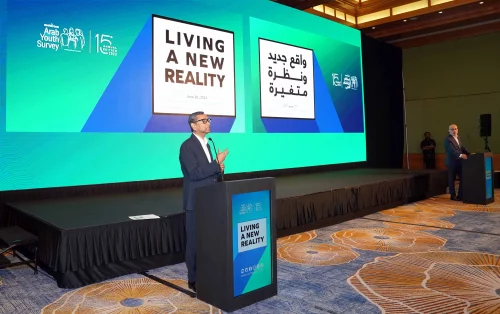
Sunil John, President – MENA, BCW and Founder of ASDA’A BCW, and Nedal Al Asaad, Executive Vice President – Public Affairs, ASDA’A BCW, present the findings of the 15th annual ASDA’A BCW Arab Youth Survey in Dubai.
Arab youth call for US disengagement from the region
However, most would like the US to be less involved in Middle Eastern affairs, with nearly two-thirds across the GCC, North Africa and the Levant countries saying they ‘strongly or somewhat support’ US disengagement from the region.
When it comes to the war in Ukraine, a slightly higher percentage of respondents (28%) believe diplomatic negotiations will lead to a compromise than say the conflict will continue for ‘a long time with no clear resolution’ (25%).
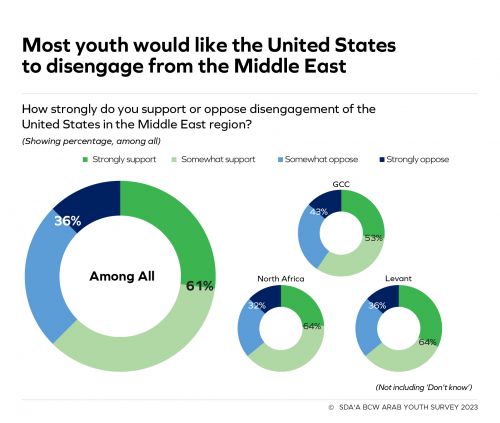
Qatar is top Arab ally
The region’s youth say they consider all the GCC countries and Egypt as strong allies. Qatar was named as ‘a strong ally or somewhat of an ally’ by 92%, followed by Kuwait (91%), Egypt (89%), the UAE (88%) and Saudi Arabia (86%).
Young Arabs were also asked about their views on Qatar hosting the FIFA World Cup 2022. An overwhelming 87% said the event had galvanised the Arab world and enhanced Arab pride, while an equal percentage said events such as the FIFA World Cup and Expo 2020 Dubai have promoted greater understanding of the Arab world in general.
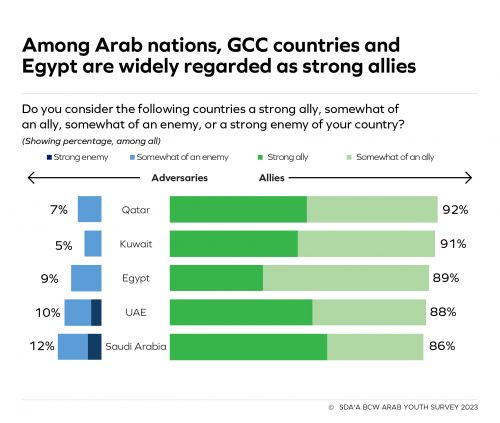
Sunil John, President, MENA, BCW and Founder of ASDA’A BCW, who has led the survey over the past 15 years, said: “The annual ASDA’A BCW Arab Youth Survey has proven to be an indispensable resource for global decision makers in government and business seeking a clearer understanding of a region that is increasingly influential in world affairs, yet still an enigma for many outside it. Once again, the study sheds new light on the Arab world’s changing geopolitical landscape.”
“We conduct this independent survey every year because we believe that to understand the Arab world, one must first understand the hearts and minds of its largest demographic, its youth,” added John. “The evidence-based insights, collected through nearly 45,000 face-to-face interviews conducted with young Arabs since the survey was launched in 2008, inform governments, the private sector, multilateral institutions and academics on policymaking, business strategy and emerging trends. To ensure its credibility and the reliability of its data, we fund the survey entirely ourselves,” he added.
“All the respondents in this year’s study belong to Generation Z and the oldest were just into their teens when the epochal events of 2008 culminated in the Arab Spring,” John said. “Like the generation before them who lived through the global financial crisis, they are coming to terms with a new reality defined, on the one hand, by simmering conflicts and the involvement of new world powers in regional affairs, and on the other, by regional governments seeking new alliances and a platform of their own on the world stage. The implications of these changes are captured in our latest, and largest, ASDA’A BCW Arab Youth Survey.”
In the coming weeks, ASDA’A BCW will publish insights under the other five themes covered in the study: My Politics, revealing what young Arab say about the performance of their government; My Livelihood, detailing their views on education, jobs, and their finances; My Identity, covering religion and issues of personal identity; My Aspirations, the hopes of young Arabs for the future; and My Lifestyle, highlighting their habits, pastimes, and the media they consume. “We believe that revealing the six themes independently provides an opportunity to better absorb these findings and understand them in the right context,” added John.
Findings on climate change, mental health and gender rights will also be disclosed, making this year’s study the most extensive in the survey’s history. The overall theme of the 15th edition of the ASDA’A BCW Arab Youth Survey is ‘Living a New Reality’.
More insights are provided in the Findings section.
-ENDS-